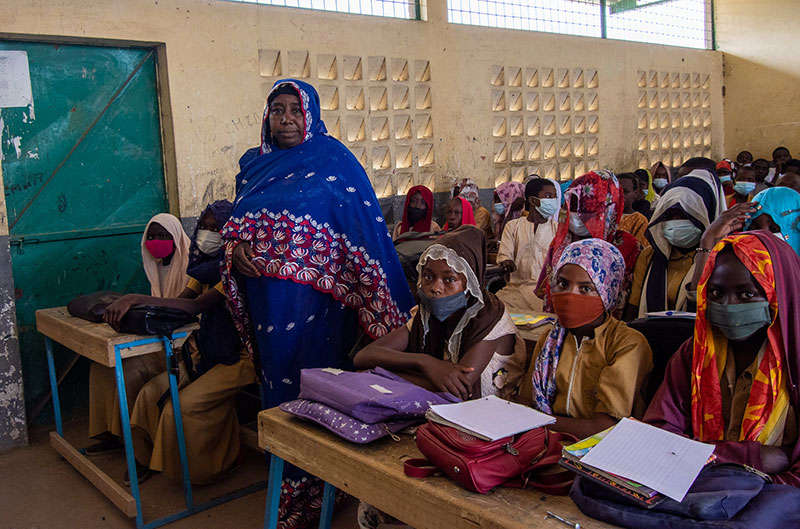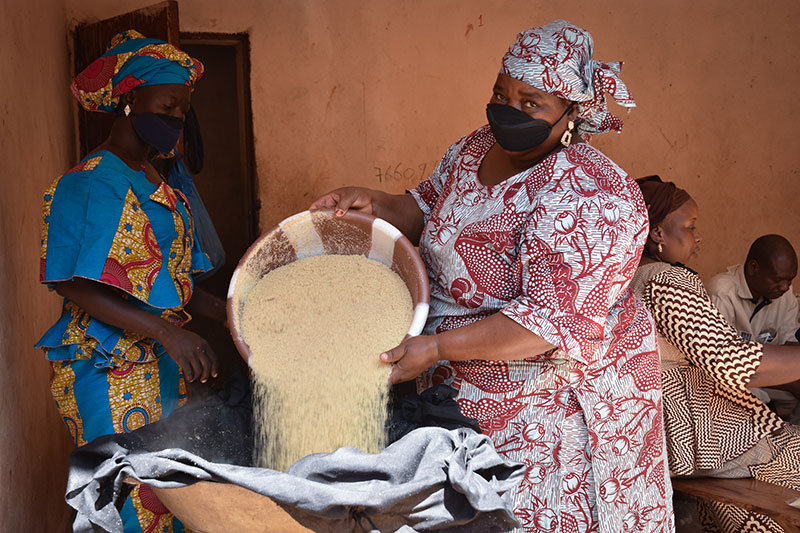Gender Equality and Women’s Empowerment: A Unique Opportunity for the Sahel
Every year, International Women’s Day provides an opportunity to take stock of the state of play regarding women’s rights. It is also an opportune occasion to acknowledge the persistence of inequalities between men and women, but also to raise awareness of the need to eliminate the barriers that prevent women from participating in and benefiting from peace and sustainable development efforts. The Sahel Alliance is committed to systematising gender mainstreaming in its operations by taking into account the specific challenges of women in the Sahel. Development partners in the Sahel region understand that gender equality and women’s empowerment represent a unique chance to accelerate the transition to stability and inclusive growth in the countries.

Gender issues and challenges in the Sahel
Despite their enormous potential, the G5 Sahel countries face socio-economic challenges that could be meaningfully addressed if women and men had access to the same opportunities. Unfortunately, gender indicators for the region remain very low, revealing the presence of deep inequalities between men and women. The African Development Bank’s Gender Equality in Africa Index indicates that the gender gap in the Sahel region remains the widest – with an average of 31.9%, which is below the continental average of 48.4%. This gives an overall gender gap of 68.1% across the three dimensions measured (economic, social and representation).
On the road to economic empowerment, women are hindered by discriminatory traditions and gender stereotypes. For example, while they provide 80% of the agricultural labour force in the Sahel and play an essential role in household nutrition, they have less access than men to the factors of production (land, inputs, equipment, digital tools, training, information, credit, etc.).
The maternal mortality rate, on the other hand, varies between 371.0 and 856.0 deaths per 100,000 live births, due to the high prevalence of early marriage coupled with low access to maternal and reproductive health care when women need and want to use these services. In Niger, for example, about 76% of girls are married before the age of 18. Female genital mutilation remains recurrent in the region with prevalence rates of up to 9 out of 10 excised women.
In addition, gender indicators for education are among the worst in the world. Over the course of her life, a Chadian woman will receive the equivalent of only 2.4 years of quality education compared to 3 years for a man. This inequality, combined with rapid population growth, will accentuate gender gaps in access to opportunities for human capital development, including education. Thus, according to current estimates, by 2030, nearly one in five women without education in Africa will come from the G5 Sahel, a figure that will jump to more than one in four by 2050.
In a security context marked by violent extremism and armed conflict, women and girls experience the double impact of an unstable security context and social discrimination. Yet they are excluded from the peace and security process in the Sahel.
Gender opportunity in the Sahel
Women are an undeniable driving force, particularly in the Sahel countries where they are at the heart of food security and community resilience. Economic, security, climate and structural crises have often pushed women into the informal economy (e.g. agro-pastoral production, processing of agricultural and livestock products, petty trade, etc.). Whether in conflict zones, refugee camps or during resettlement, women are at the heart of family resilience and help reduce their vulnerability to shocks. Their essential role has increased as a result of the health crisis, with an increased unpaid workload and reduced access to sources of income (due to restrictions).
The involvement of Sahelian states through the upholding of their international gender-related commitments and the gender-sensitive strengthening of policies and legal frameworks will be supported by the Sahel Alliance. The clear political will to rebuild a more inclusive and resilient post-COVID 19 society and the international mobilisation, notably through the Sahel Alliance, present concrete opportunities to promote a more prominent role for women in development projects and stabilisation efforts. As Ms. Nana Aïcha Cissé, Regional Coordinator of the G5 Sahel Women’s Platform, acknowledges, “Women’s economic empowerment is unquestionably the key to resolving security and development issues in the Sahel”.
A position supported by the Sahel Alliance through the intervention of Mrs. DIAZ, Director of Cooperation with Africa and Asia at the Spanish Agency for International Development Cooperation, during the celebration of the 20th anniversary of Resolution 1325: “the effective participation of women in the construction and consolidation of peace and security is not only a question of justice and human rights but also a question of efficiency since the participation of women at all levels is crucial for the construction and consolidation of peace processes”.

Gender in Sahel Alliance projects
The Sahel Alliance finances various operations that promote gender equality, including the following:
- In Burkina Faso, the project “Empowerment, Access to Sexual and Reproductive Health and Better Involvement of Vulnerable Women and Youth in Environmental Protection and Conflict Prevention and Management”, funded by Luxembourg to the tune of 5 million Euros, promotes the empowerment of vulnerable/marginalised women and adolescents, the respect of their sexual and reproductive health rights, their involvement in environmental protection and the prevention and peaceful management of conflicts.
- In Chad, the Girls’ Education and Women’s Literacy Project (PEFAF), financed by the African Development Bank in the amount of eight million units of account (US$11.26 million), will contribute to improving access to quality secondary education in a healthy and safe school environment for 5,000 girls and allow for the training of 2,200 teachers from the pedagogical supervisory corps and administrative officials. It will provide literacy programmes for more than 7,500 women in two provinces (Hadjer Lamis, Ouaddaï) and N’Djamena, and raise awareness in the project area on the importance of girls’ schooling in order to reduce early marriage and pregnancy and gender-based violence.
- In Mauritania, the project “Strengthening the capacity of the Mauritanian police force to handle gender-based violence (GBV)“, funded by the Spanish cooperation agency (AECID), works with the police force (especially the juvenile brigade) to raise awareness on GBV (sexual in particular) and improve the procedures for addressing it. The project has strengthened the police’s capacity to provide an adequate response to victims and to improve institutional collaboration with health services for their medical care. A GBV prevention plan, with the involvement of key stakeholders for the protection of rights (local authorities, justice and police personnel, civil society) was also developed, as well as a communication plan to reinforce the social destigmatisation of victims.
- In Chad, the three phases of the project “Improving the chances of survival and development of children”, funded by the German cooperation to the tune of 33 million euros, contribute to reducing maternal and infant mortality by improving the quality of health services and by raising awareness among pregnant and breastfeeding women on the importance of using them.
- In Niger and Chad, the project “Inclusive Economic and Social Development of the Lake Chad” (co-financed to the tune of 36 million euros by the French Development Agency and the European Union, with 500 k€ of UK support dedicated to gender), which aims in particular to support a sustainable local economy and strengthen social cohesion, takes into account the gender dimension in all its components to meet the specific needs of women and girls.
- In Mali, Niger and Chad, the project “Economic Empowerment of Vulnerable Women”, funded by the African Development Bank, aims to improve access to economic resources for women and young women and to strengthen the economic resilience of households in areas exposed to violence. The project finances income-generating activities (in agriculture, livestock, trade and handicrafts), strengthening women’s entrepreneurial capacities and policy dialogue for a conducive environment to reduce gender disparities in access to economic resources.
- Cross-cutting theme among the Sahel Alliance: gender
- Investing in a better future for girls
- Results report: 3 year of Sahel Alliance
Copyright pictures: Aude Rossignol

